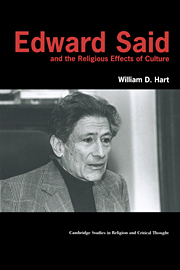Book contents
- Frontmatter
- Contents
- Preface
- Abbreviations
- Preliminary remarks
- 1 Culture as the transfiguration of religious thought
- 2 The religious effects of culture: nationalism
- 3 The religious effects of culture: Orientalism
- 4 The religious effects of culture: imperialism
- 5 The responsibilities of the secular critic
- 6 Marx, Said, and the Jewish question
- Concluding remarks: religion, secularism, and pragmatic naturalism
- Appendix A Whose exodus, which interpretation?
- Appendix B An exchange of letters between Michael Walzer and Edward Said
- Notes
- Select bibliography
- Index of names
Preliminary remarks
Published online by Cambridge University Press: 22 September 2009
- Frontmatter
- Contents
- Preface
- Abbreviations
- Preliminary remarks
- 1 Culture as the transfiguration of religious thought
- 2 The religious effects of culture: nationalism
- 3 The religious effects of culture: Orientalism
- 4 The religious effects of culture: imperialism
- 5 The responsibilities of the secular critic
- 6 Marx, Said, and the Jewish question
- Concluding remarks: religion, secularism, and pragmatic naturalism
- Appendix A Whose exodus, which interpretation?
- Appendix B An exchange of letters between Michael Walzer and Edward Said
- Notes
- Select bibliography
- Index of names
Summary
EXODUS AND THE QUESTION OF PALESTINE
There is no Israel without the conquest of Canaan and the expulsion or inferior status of Canaanites – then as now.
(Edward Said, “An exchange: Michael Walzer and Edward Said”)The publication of Michael Walzer's Exodus and Revolution ignited a controversy of extraordinary bitterness between Walzer and Said. At issue is the question of representation. What is the most appropriate way of representing the Exodus narrative and its contemporary political implications? With clarity, subtlety, and simplicity, which are the signature of his neo-Orwellian style, Walzer presents an argument for the Exodus narrative as a paradigm for revolutionary politics. This book might have received little notice (even as I write it has been underanalyzed and perhaps underappreciated) had it not been for a stinging review of the book by Said. Walzer's book, he argues, is a sophisticated legitimation of contemporary Israeli–Palestinian relations, a historical repetition of the conquest of the land of Canaan. This review led to an exchange of letters between the two men (one a Palestinian American, the other a Jewish American) that is nothing if not vitriolic. The ascending spiral of the vitriol – the review, rebuttal, and surrebuttal – suggests that something very important is at stake in this disagreement. What are at stake, I argue, are not only competing views of how a religious narrative should be represented, but differing views on the nature of secularism and the responsibility of the intellectual.
- Type
- Chapter
- Information
- Edward Said and the Religious Effects of Culture , pp. 1 - 16Publisher: Cambridge University PressPrint publication year: 2000

